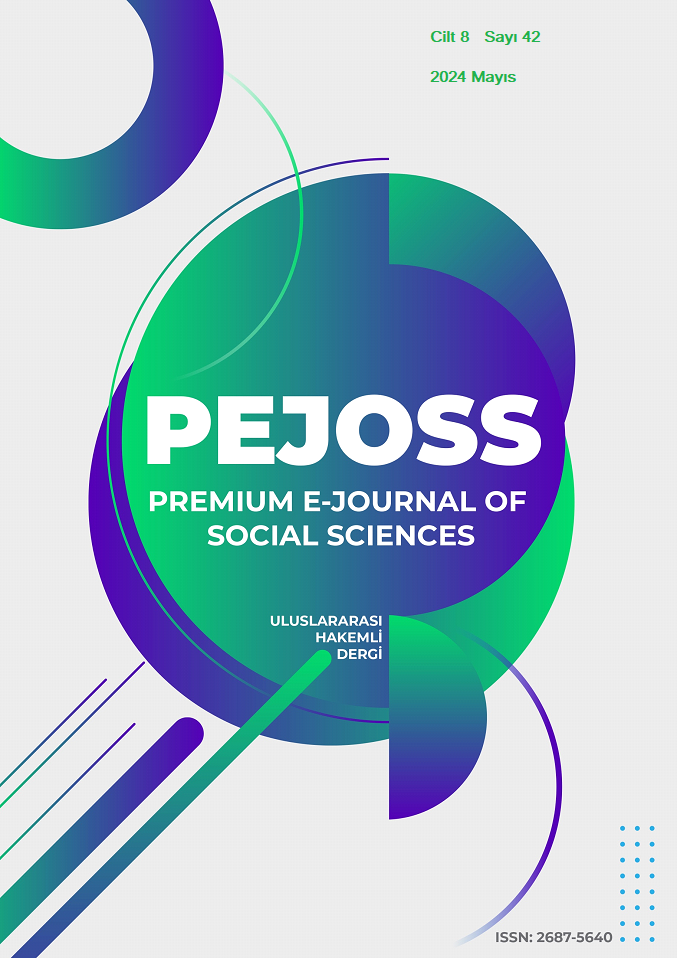The Mediating Role of Communıcation in the Effect of Motivation on Productivity and Research on this Subject
DOI:
https://doi.org/10.5281/zenodo.11503295Keywords:
Motivation, Productivity, CommunicationAbstract
The aim of this study is to examine the mediating role of communication in the effect of motivation on productivity in organizations. For this purpose, the mediating role of communication in the effect of motivation on the productivity of 300 employees in 6 privately owned enterprises in Istanbul province was evaluated. "Organizational Communication Scale" developed by Yılmaz (2011a), the motivation dimension of the "Employees' Perception Scale on Leadership Types" developed by Yılmaz (2011b) and the "Employee Productivity Scale" developed by Yüksel (2023) were used as data collection tools. The questionnaire form was administered to the participants online via the Google Forms application. The data obtained were analyzed in the SPSS 22.0 package program. T-test and ANOVA were used to compare the mean scores obtained from the scales, and the Pearson Correlation test was used to examine the relationship between variables. Regression analysis was used to examine the effect between dependent and independent variables. Within the scope of the research, the mediating role of communication in the effect of the motivation status of the participants on their productivity according to age, education level, working style and seniority variables was analyzed. As a result of the research, it was concluded that communication has a mediating role in the effect of employees' motivation levels on productivity; as motivation levels increase, productivity and communication skills also increase; and the productivity of employees with high communication skills also increases. It was concluded that age and education level variables affect motivation, productivity and communication skills, the seniority variable affects productivity and the working style variable has no effect.
Downloads
References
Akduran, E. (2019). Çalışan dayanıklılığının işletmelerde verimlilik algısına etkisi [Yayımlanmamış yüksek lisans tezi]. T.C. Trakya Üniversitesi Sosyal Bilimler Enstitüsü.
Aktan, E. (2007). Kurumsal iletişim sürecinde liderin rolü [Yayımlanmamış yüksek lisans tezi]. T.C. Selçuk Üniversitesi Sosyal Bilimler Enstitüsü.
Anıl, İ.A. (2010). İşletmelerde iletişim olgusu ve iletişim sürecinde dönüşüm [Yayımlanmamış yüksek lisans tezi]. Sakarya Üniversitesi Sosyal Bilimler Enstitüsü.
Avcı, N. (1988). İletişim düşüncesinin gelişimi. Anadolu Üniversitesi Yayınları.
Avcı, Ö. (2019). Duygusal zekâ ve iletişim. 2. Baskı. Beta Basım Yayım Dağıtım A.Ş.
Çağlar, M. E. (2014). Kişiler arası iletişimde etkinlik ve empati. Ed.: İ. Çağlar ve S. Kılıç, Genel, teknik ve etkili iletişim, Nobel Akademik Yayıncılık Eğitim Danışmanlık.
Demirtaş, U. ve Tokat, E. (2012). Verimlilik yönetiminde ölçme ve teşhis: bir kobi uygulaması. Verimlilik Dergisi, 3, 7-38.
Doğan, M. (2006). İşletme ekonomisi ve yönetimi, Birleşik Matbaacılık.
Durak Ataay, İ. (1988). İşletmelerde insan gücü verimliliğini etkileyen faktörler, Mess Yayını.
Genç, N. (2007). Yönetim ve organizasyon, Seçkin Yayıncılık.
Güney, S. (2020). Örgütsel Davranış, 5. Baskı, Nobel Yayıncılık.
Hökelekli, H. (2006). Günümüz iletişim teknikleri ve dinî iletişim. Diyanet İlmi Dergi, 42(1), 41-58.
Kâhya, E. ve Polat, O. (2007). Bir işletmenin mekanik işler atölyesinde oranlarla işgücü verimlilik yönetim sistemi”, Verimlilik Dergisi, (2), 9-36.
Karaçor, S., Şahin, A. (2004). Örgütsel iletişim kurma yöntemleri ve karşılaşılan iletişim engellerine yönelik bir araştırma. Sosyal Ekonomik Araştırmalar Dergisi, 4(8), 96-117.
Ruthankoon, R., Ogunlana, S. O. (2003). Testing herzberg’s two‐factor theory in the thai construction industry. Engineering, Construction and Architectural Management, 10(5), 333-341.
Öztürk, Z., Dündar, H. (2003). Örgütsel motivasyon ve kamu çalışanlarını motive eden faktörler. Cumhuriyet Üniversitesi. İktisadi ve İdari Bilimler Dergisi, 4(2), 57-67.
Saunders, M.N.K, Lewis, P., & Thornhill, A. (2016). Research Methods for Business Students, 7th edition, Pearson.
Tunçer, P. (2013). Örgütlerde performans değerlendirme ve motivasyon. Sayıştay Dergisi, (88), 87-108.
Ünlü, D. (2018). Yöneticilerin iletişim tarzı ile liderlik tarzları (türleri) arasındaki ilişki [Yayımlanmamış yüksek lisans tezi]. Hasan Kalyoncu Üniversitesi Sosyal Bilimler Enstitüsü.
Uğur, A. (2013). İşletmelerde verimlilik ders notları, 2. Baskı, Sakarya Yayıncılık.
Yıldız, S., Savcı, G., Kapu, H. (2014). Motive edici faktörlerin çalışanların iş performansına ve işten ayrılma niyetine etkisi. Yönetim ve Ekonomi, 21(1), 233-249.
Yılmaz, E. (2011a). Örgütsel Bağlılığa İletişimin Etkisi: Bir Örnek Olay [Yayımlanmamış Yüksek Lisans Tezi]. T.C. Sakarya Üniversitesi Sosyal Bilimler Enstitüsü, Sakarya.
Yılmaz, M. K. (2011b). Çalışanların Liderlik Tiplerine İlişkin Algılamaları ile Motivasyon İlişkisi: Özel Sektör ve Kamu Sektörü Çalışanları Üzerine Bir Alan Araştırması [Yayımlanmamış Yüksek Lisans Tezi]. T.C. Ege Üniversitesi Sosyal Bilimler Enstitüsü.
Yüksel-Sahin, F. (2008). Communication skill levels in Turkish prospective teachers. Social Behavior and Personality: An International Journal, 36(9), 1283-1294. https://doi.org/10.2224/ sbp.2008.36.9.1283.
Yüksel, E. (2023). Düzce Üniversitesi İdari Personelinin Presenteeism, Örgütsel Dışlanma ve Verimlilik Algıları Arasındaki İlişki [Yayımlanmamış Doktora Tezi]. T.C. Bolu Abant İzzet Baysal Üniversitesi Lisansüstü Eğitim Enstitüsü.
Downloads
Published
How to Cite
Issue
Section
License
Copyright (c) 2024 Premium e-Journal of Social Science (PEJOSS)

This work is licensed under a Creative Commons Attribution 4.0 International License.


